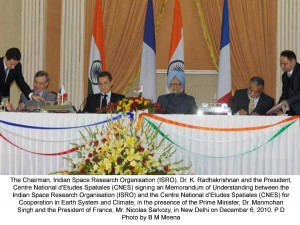The second part of the speech is consecrated to disarmament. It is probably the most detailed account by a French President
- When international security improves, France draws the consequences. It did so with the end of the Cold War.
- Rather than making speeches and promises that are not translated into deeds, France acts.
Also read: France & Nuclear Disarmament between vision & realism-II
- We respect our international commitments, and notably the Nuclear Non-Proliferation Treaty.
- France has an exemplary record, unique in the world, with respect to nuclear disarmament.
Also read: France & Nuclear Disarmament between vision & realism-I
- France was the first State, with the United Kingdom, to sign and ratify the Comprehensive Test Ban Treaty; the first State to decide to shut down and dismantle its facilities for the production of fissile materials for explosive purposes; the only State to have transparently dismantled its nuclear testing facility in the Pacific; the only State to have dismantled its ground-launched nuclear missiles; the only State to have voluntarily reduced the number of its nuclear-powered ballistic missile submarines by a third.
- France has never engaged in the arms race. France never manufactured all the types of weapons that it was technologically capable of designing. France applies a principle of strict sufficiency:
- It maintains its arsenal at the lowest possible level compatible with the strategic context.
 Some concrete decisions
Some concrete decisions
- I have also decided that France could and should be more transparent with respect to its nuclear arsenal than anyone ever has been.
- After this reduction, I can tell you that our arsenal will include fewer than 300 nuclear warheads. That is half of the maximum number of warheads we had during the Cold War.
- Furthermore, I can confirm that none of our weapons are targeted against anyone.
- Finally, I have decided to invite international experts to observe the dismantlement of our Pierrelatte and Marcoule military fissile material production facilities.
- But let us not be naïve; the very basis of collective security and disarmament is reciprocity.
- Today, eight nations in the world have declared they have conducted nuclear tests. I am proposing to the international community an action plan to which I call on the nuclear powers to resolutely commit by the 2010 NPT Conference.
- Thus I invite all countries to ratify the Comprehensive Test Ban Treaty, beginning with China and the United States, who signed it in 1996. It is time for it to be ratified.
- I urge the nuclear powers to dismantle all their nuclear testing sites in a manner that is transparent and open to the international community;
- I call for the immediate launching of negotiations on a treaty to ban the production of fissile materials for nuclear weapons purposes, and to establish without delay a moratorium on the production of such materials;
The statement made by Rajiv Gandhi in the UN in June 1988, received little echo outside India. In the French Press, I only found a small article of 91 words”¦
- I invite the five nuclear weapon States recognized by the NPT to agree on transparency measures;
- Propose opening negotiations on a treaty banning short- and intermediate-range surface-to-surface missiles;
- I ask all nations to accede to and implement the Hague Code of Conduct Against Ballistic Missile Proliferation, as France has done.
Sarkozy ended his speech by these words: “I guarantee you: France will not lower its guard”.
Though there is no real debate, many in France, including two former French Prime Ministers, Michel Rocard and Alain Juppé are advocating a review of the use of nuclear weapons by the French State. But it may not happen in a near future. President Sarkozy made an important point in Cherbourg, the question of reciprocity.
On Rajiv Gandhi’s Proposal
The statement made by Rajiv Gandhi in the UN in June 1988, received little echo outside India. In the French Press, I only found a small article of 91 words mentioning Rajiv Gandhi’s announcement in the French daily Le Monde.21
On June 11, 1988 Le Monde just said: “Indian plan for disarmament: on June 9, India has presented a plan for global disarmament at the UN. The Indian PM, Rajiv Gandhi made this proposal during the Third Session of the General Assembly on Disarmament. The Indian plan, whose objective is to replace the NPT which expires in 1995, proposes that all nations commit themselves to step by step [disarmament], eliminate all the nuclear weapons not later than 2010 and start talks at the UN for negotiating a global security plan.”
“¦policy-makers dont take decisions in the realm of war and peace, armament and disarmament, because of a plan agreed in a diplomatic conference. They do it because it is in their countrys national security interest”¦
A few days earlier, Le Monde had reported the Third Summit of the Group of Six created in 1984 “to promote disarmament and peace and stop the global suicide”. The participants were the Mexican President Miguel de la Madrid; the Greek PM, Andréas Papandréou; the former Tanzanian Head of the State, Julius Nyerere; the Indian PM, Rajiv Gandhi; the Swedish PM, Ingvar Carlsson and the Argentinean Foreign Minister, Dante Caputo. The Summit proposed to use the summit to “support efforts displayed by Superpowers to reach disarmament”. The Group of Six adopted a ‘Stockholm Declaration’, asking for a ban on nuclear tests. They even renewed their proposal to survey and monitor a ban on atomic experiments. The French newspaper commented: “These initiatives of the six nations received a mixed welcome; the composition of the group is rather surprising, India, for example, has not signed the Treaty of Non-Proliferation of 1968”




